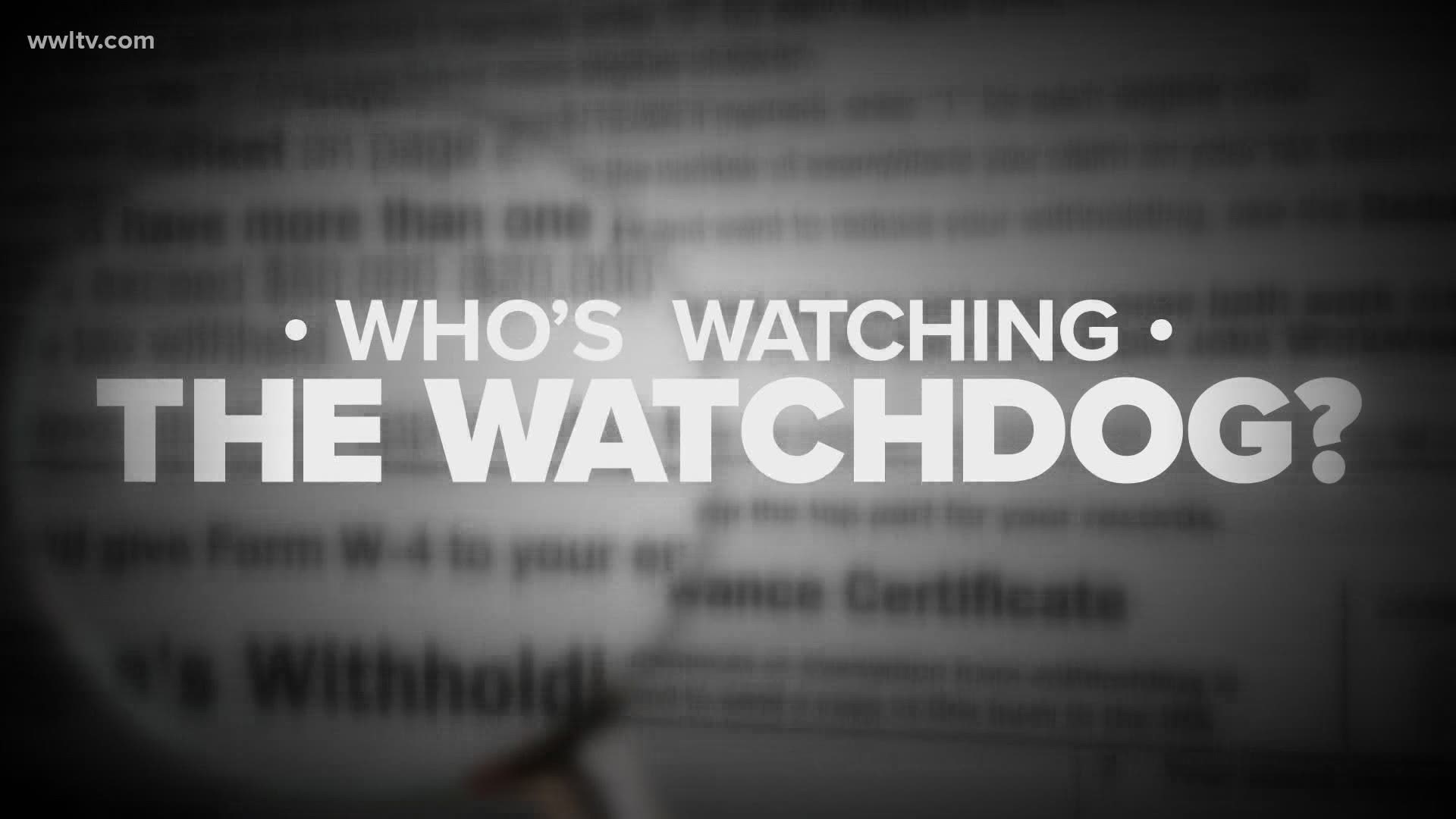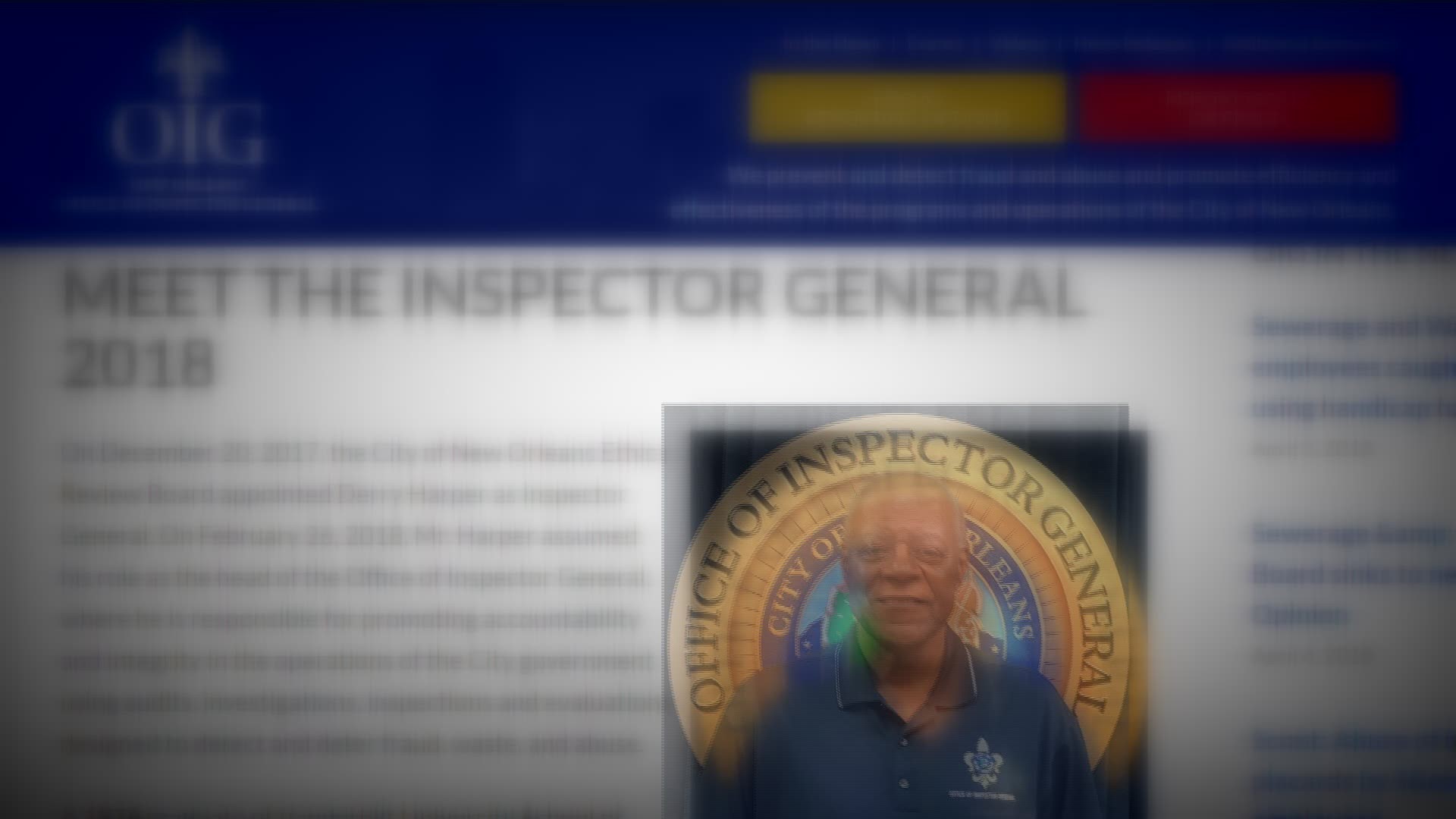NEW ORLEANS — In one of his last public meetings as New Orleans Inspector General, Derry Harper spoke eloquently about his upcoming “retirement,” including his desire to spend more time with his family. He also talked about the lofty mission of the office, which is designed to root out waste and corruption in city government.
“I have truly appreciated the engagement and being responsible in this particular instance, adding transparency to the Inspector General's office,” Harper said in the Oct. 1 meeting, held remotely on Zoom due to the coronavirus pandemic.
But to Harper’s critics, his amiable departure speech after nearly three years as IG was the opposite of transparency.
It was a charade.
By their account, Harper was forced out after a mutiny by nearly his entire staff of more than a dozen employees, according to the multiple sources inside and outside of the IG’s office.
Watch Part 1 of WWL-TV's investigation here:
The terms of his departure were ultimately hashed out on Sept. 4 in a four-hour executive session of the Ethics Review Board, which supervises the IG’s office.
“Obviously we can't talk about what happened in executive session,” ERB counsel Dane Ciolino said. “But as the agenda reflected, we did discuss the character and competence of a person and shortly after that executive session, Mr. Harper decided to retire.”
Ethics Board Chairman Mike Cowan was more direct.
“There was no one on the board who thought that he should stay,” Cowan said. “There was some discussion about whether there might be something the board could do by way of discipline.”
According to an array of sources connected to the watchdog city agency, Harper will be leaving an office disillusioned and in disarray. The sources, from inside and outside the office, say Harper was often like a phantom, frequently absent and rarely engaged in the work.
Harper was publicly warned several times about the meager quantity and quality of reports in reviews by the ERB, but complaints continued to grow.
Ultimately, several people came to the board confidentially as whistle-blowers.
“What they had to say was very disturbing,” Cowan said.
Based on the information, the board launched an internal review of Harper’s performance by interviewing nearly every member of the IG’s staff. While the contents of the report remain confidential, Cowan said it provided ample justification for Harper’s dismissal.
“My feeling was that we had 10 witnesses who just told us the same thing about the same situation,” Cowan said.
Harper did not go down without a fight, bringing in an attorney to represent him. The board, citing the desire to avoid a litigious and potentially messy firing, agreed to let Harper stay for another six weeks after that contentious meeting. With his last day on Oct. 31, his original contract ending in 2022 is being cut short by more than a year.
So what happened over the nearly three years that Harper was paid about $200,000 a year to preside over a $4 million-a-year watchdog agency housed inside the Federal Reserve Bank building?
Swipe card records from the high-security building obtained exclusively by WWL-TV show that in 2019, before the coronavirus pandemic forced many people to work from home, Harper’s physical attendance was spotty.
Harper only logged seven five-day workweeks at his office out of 52, the records show. Three of those weeks came in June.
In the final four months of 2019, the records show Harper was at the office on 36 workdays, but absent for 49. In December alone, he was out twice as much as he was in, 14 days compared to 7.
“Not only did he fail to show up in anything like a satisfactory way – I've never seen anything worse, honestly – but he didn't make up for that by working from home or being available by other means,” Cowan said.
Harper was selected for the job in late 2017 after a national search. His resume is impressive: Vanderbilt law graduate, years as state and federal prosecutor, and a couple of stints as an inspector general in Florida state government.
But there also was a red flag. In 2013, he was forced out from his last inspector general job at the Florida public university system because he didn't have the required accounting background or training.
“I don't remember a serious discussion about whether that was a disqualifier,” Cowan said.
Harper came on board at the beginning of 2018 vowing to mend an office that became divided in the final year under former IG Ed Quatrevaux. Right away, he solicited ideas from city council members on where to aim the considerable investigative powers of his office.
“We suggested a few topics, one of them, for example, was short-term rentals,” Councilmember Joe Giarrusso said.
Harper said he would review the complex and contentious issue as the council debated sweeping new regulations, but that never happened. The council adopted a new set of regulations without any of the requested input from the Inspector General’s office.
Council member-at-large Helena Moreno had an even more pressing matter in early 2018. The council needed an investigation into the fresh scandal in which Entergy New Orleans paid actors to play the role of supporters at a high-stakes meeting on whether to approve a new power plant the company was lobbying for build in New Orleans East.
“We had reached out to the IG's office and we would call and call and no one would even answer the phone,” Moreno said.
The council ended up hiring an outside firm to conduct the investigation.
“If we couldn't even get a return call, then that probably wasn't going to be the most efficient way to have a very thorough investigation,” Moreno said.
Over the next two-and-half years, the city was rocked by significant issues tailor-made for IG oversight: persistent street flooding and break-downs at the Sewerage and Water Board, the cyber-attack on the city's computers, the coronavirus pandemic, and more recently, furloughs and budget cuts.
But under Harper, the IG's office hasn't addressed any of those issues. Records show the office has underperformed compared to the previous New Orleans IG and the more recently created Jefferson Parish IG’s office.
In eight years before Harper took over, the New Orleans office averaged 17 reports a year, the records show. In Jefferson Parish, IG Dave McClintock put out 9 reports in his first full year in 2018. Harper put out two reports in his first year, and peaked at seven reports last year.
“It makes you wonder: What's going on? Because to your point, you're almost 400, 500 percent below the productivity of other offices,” Giarrusso said.
Of all the pressing issues facing the city, one of the biggest is the collapse of the Hard Rock Hotel site, and any role the City's Safety and Permits office may have had in that tragedy.
Both the Mayor's office and the City Council announced they would launch independent investigations, but Harper asked them to stand down.
“Before we could even have our first public hearing, he sent me a letter saying to not have this public hearing because he's been doing some investigation on this for years,” Moreno said.
Despite promises, the IG's office hasn't issued any public reports, leading city officials to proceed with their own investigations.
“You have been looking at something from safety and permits for several years,” Moreno said. “What's going on with that? And let me just fast-forward to today. We still don't know what's going on with that investigation.”
Harper's office did publish two reports since he announced his resignation, including one on Sept. 15, immediately after he submitted his resignation.
The reports criticize expenditures, protocols and payroll practices of the Audubon Institute from 2012 to 2014. The reports were quickly slammed as irrelevant.
The final IG report was issued Wednesday, and within hours The Audubon Institute responded with a press release under the heading, “Five Year Long Audit of Audubon Continues to Find Zero Fraud or Abuse.”
“The bottom line was there have only been a couple of reports, almost all of which were either stale completely or significantly,” Giarrusso said generally of the office’s productivity under Harper.
WWL-TV reached out to Derry Harper repeatedly over the past several weeks. While previous attempts to schedule an interview went unanswered, Harper called Thursday afternoon and agreed to an interview before he officially leaves the job on Saturday.
In the brief phone call, Harper did not address the issues of absenteeism, dysfunction and low productivity. But he did talk about his Oct. 31 departure, refuting the Ethics Review Board account that he was forced out.
Harper said he is leaving voluntarily and on his own timetable.
More Stories:
► Get breaking news from your neighborhood delivered directly to you by downloading the new FREE WWL-TV News app now in the IOS App Store or Google Play.


